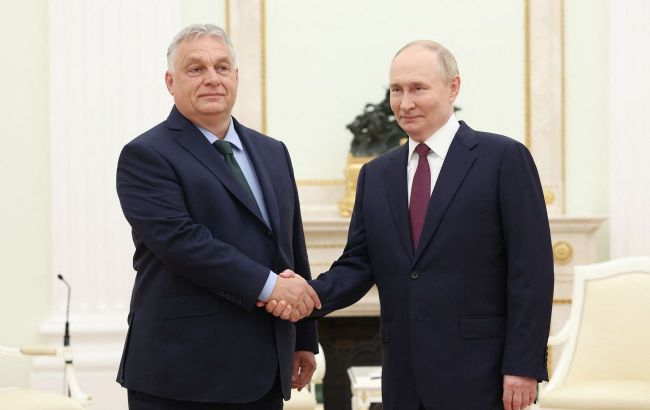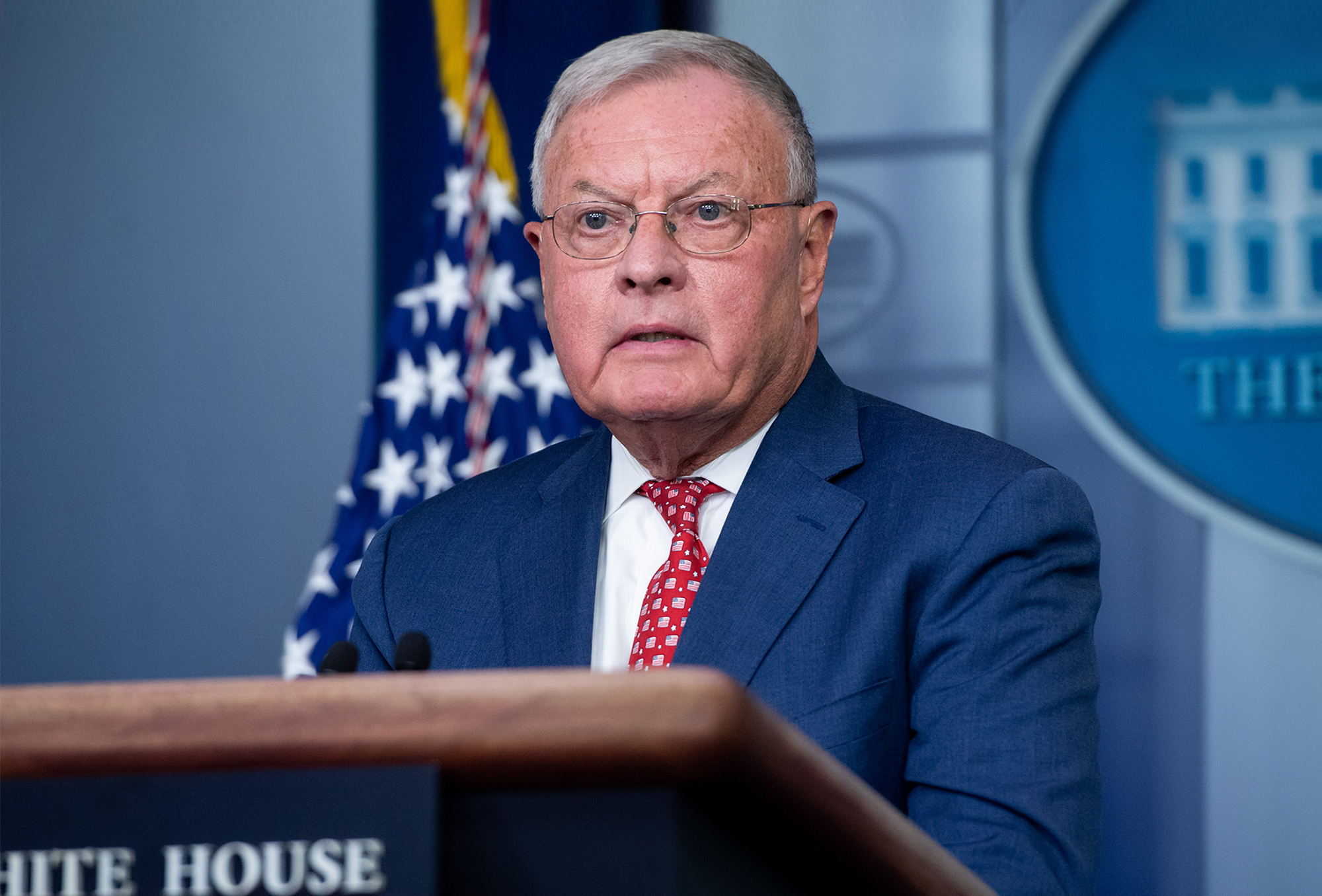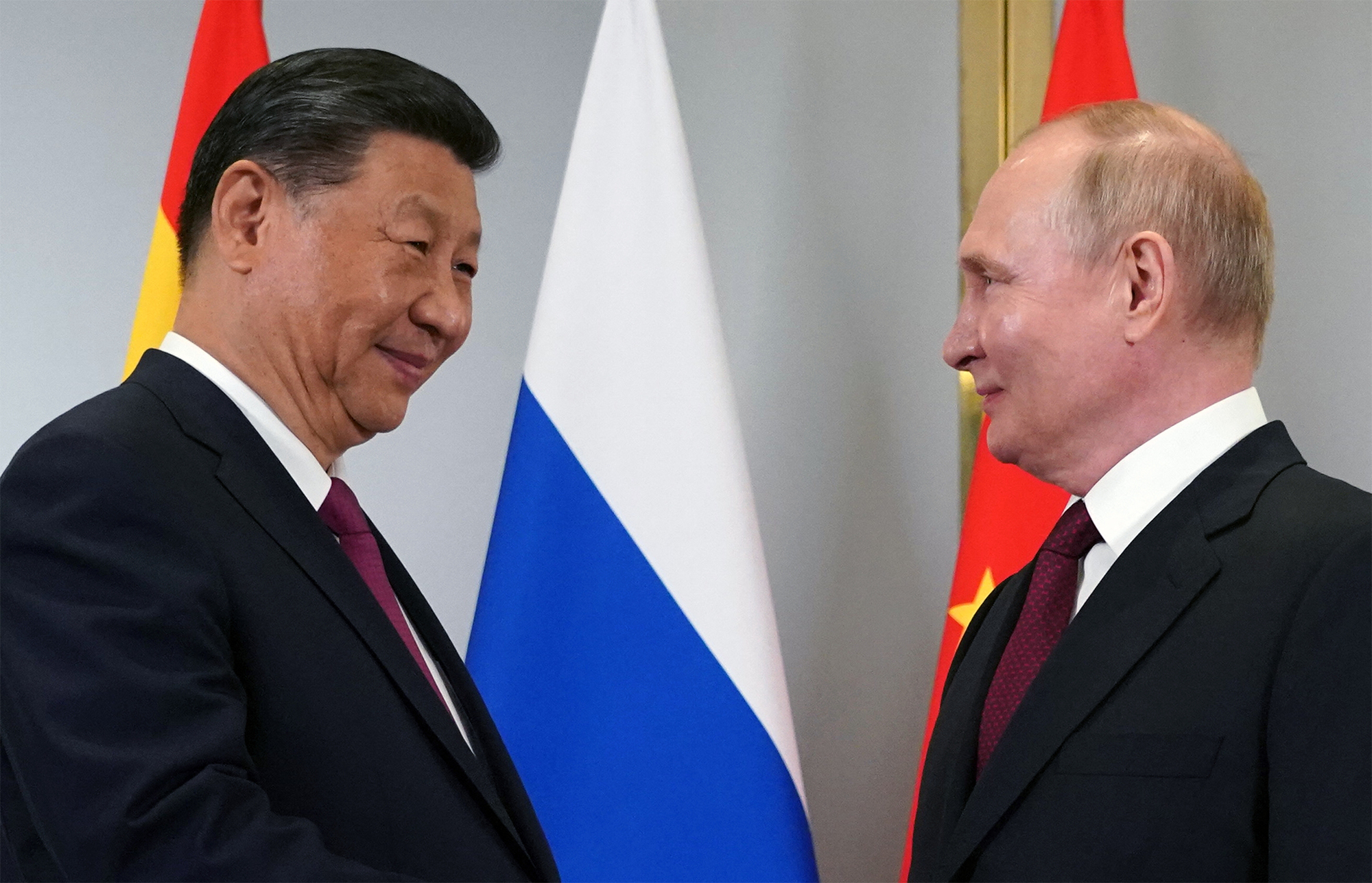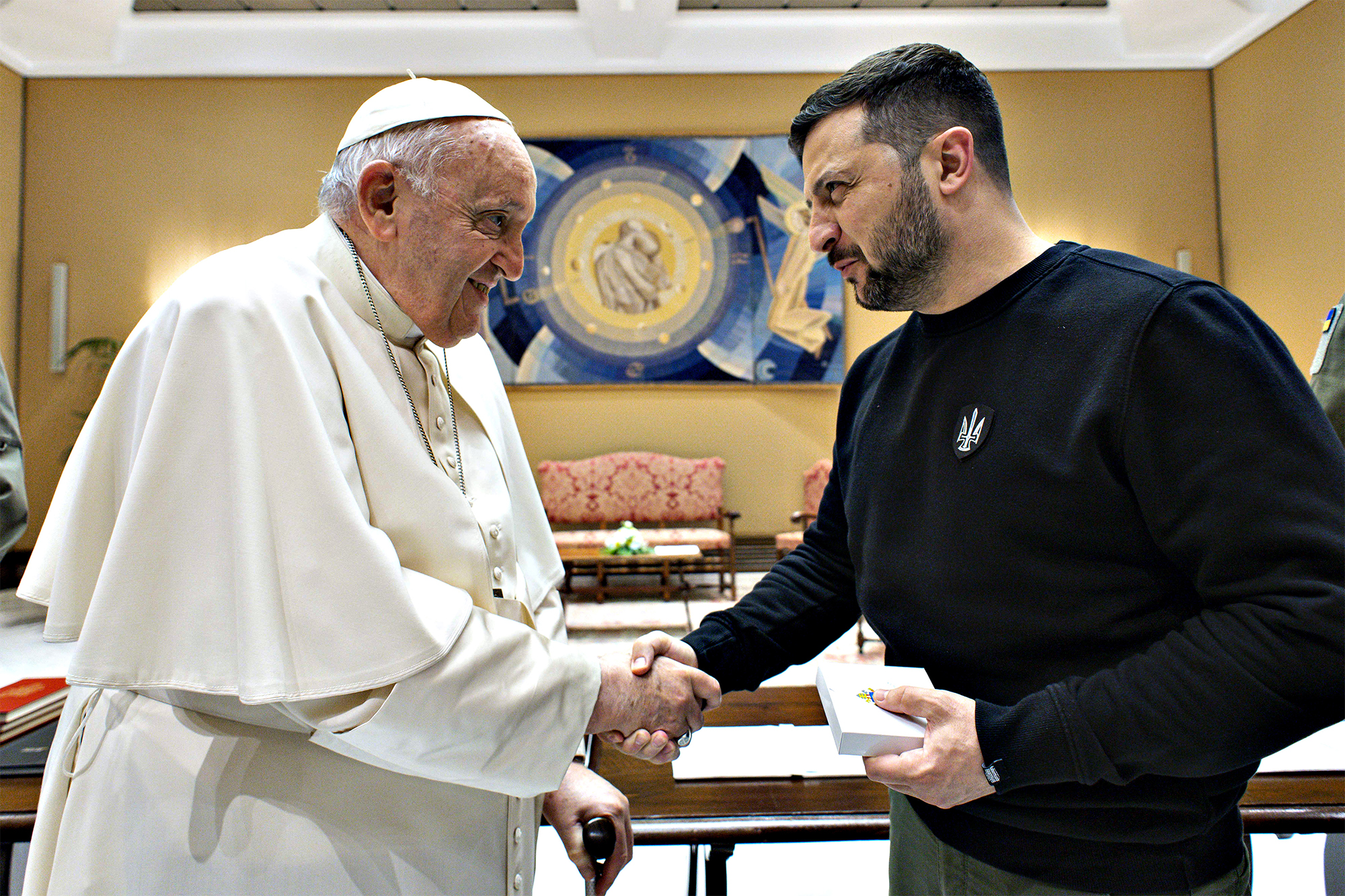Orbán, USA, China: What to expect from mediators between Ukraine and Russia
 Viktor Orbán and Vladimir Putin in Moscow (photo: Getty Images)
Viktor Orbán and Vladimir Putin in Moscow (photo: Getty Images)
During the full-scale Russian aggression against Ukraine, several intermediaries have tried to "reconcile" Kyiv and Moscow. Viktor Orbán's self-proclaimed "peacekeeping mission" has once again revived this topic. Can the US, China, Hungary, or other countries become intermediaries? More details you can find in the article by RBC-Ukraine below.
Contents
- USA: Possible mediator
- China: Hidden mediator
- Hungary: Unwelcome mediator
- Other mediators: Only on specific issues
- What the Ukrainian government thinks about mediators
Over the past two and a half years, various entities have tried to "reconcile" Ukraine and Russia: the Vatican, Israel, Hungary, Turkiye, Saudi Arabia, and even a group of African countries. Recently, this issue has gained momentum amid a series of statements from both Ukrainian and foreign leaders. Moreover, Hungarian Prime Minister Viktor Orbán is trying to combine initiatives from the most influential players with his shuttle diplomacy.
However, not everyone can be a mediator between Ukraine and Russia on the key issue of peace, even in the distant future. According to President Volodymyr Zelenskyy, a mediator must have an economy that influences Russia or a very powerful army that Putin fears and which is stronger than the Russian one.
"I think the US is such a country, I think China is such a country, and I think the EU is as well. Not just one country in the EU, no - the entire European Union," Zelenskyy said on July 8 during a press conference in Warsaw.
The European Union is currently politically divided to act as a single voice, especially on such a complex issue as mediation between the warring parties. Additionally, European leaders are not even considering such an option, as evidenced by the harsh response to Orban's diplomatic efforts. The situation with the other two mediators mentioned by Zelenskyy is complicated.
USA: Possible mediator
The position of the current administration of the US President is clear, at least publicly. There are regular contacts between Washington and Moscow just in case, as these are two nuclear states. The last time the defense ministers of both countries spoke by phone was on July 12. But there is no dialogue at the highest level.
"I am not ready to talk to Putin unless he is ready to change his behavior," Biden explained during a press conference on July 12.
However, it is far from certain that Biden will be re-elected for a second term, given the failure of the debates, his increasingly frequent public gaffes, and the strengthening positions of his opponent. The Trump team, in turn, does not hide the preparation of their peace plan.
At the end of June, Trump's national security advisors Keith Kellogg and Fred Fleitz outlined the general idea of the plan in a comment to Reuters: the idea is to force Ukraine into peace negotiations with the Russian Federation. And if Ukraine refuses, to stop supplying it with weapons. If Russia refuses to come to the negotiating table, military support for Ukraine will be increased. The plan also includes delaying Ukraine's entry into NATO for a long time and possible territorial concessions.

Lieutenant General (Retired) Keith Kellogg (Photo: Getty Images)
The details of the plan will be agreed upon later, in case Trump wins the election. However, it is known that several high-ranking European officials, including foreign ministers, met with Keith Kellogg during the recent NATO summit in Washington to explore the ground. At the same time, there is currently a real competition around Trump between various advisors, consultants, and technologists, each of whom is trying to "sell" their vision of his presidential program as the most promising.
At the same time, several decisions were made at the same NATO summit, which are aimed at limiting Trump's ability to reduce aid to Ukraine in principle.
China: Hidden mediator
China's "peace plan" was published back in February 2023. Even then, there were well-founded suspicions that its points were agreed upon with Russia. The document, titled "China's Position on the Political Settlement of the Ukraine Crisis" (as Beijing refers to Russia's aggression against Ukraine), consists of 12 points and calls for a ceasefire and the resumption of negotiations but does not contain concrete steps.
So it gathered dust for a long time until the Peace Summit in Switzerland. Right before the event, and after Xi met with Putin, the "peace plan" was suddenly mentioned again. Among other things, due to China's actions, several important Global South states for Ukraine refused to participate in the Summit.
In early June, Foreign Minister Wang Yi stated that 45 countries supported this proposal, with more than two dozen either joining or "seriously considering" it.
However, after the Summit, China again put its initiative on pause. Notably, Chinese leader Xi Jinping did not mention the "peace plan" during the Shanghai Cooperation Organization (SCO) summit in Astana on July 3-4. This event gathered most of the influential Asian countries, so the platform for announcements should have been appropriate. Instead, Putin mostly spoke about peace negotiations at the summit, often incoherently.

Chinese leader Xi Jinping and Russian President Vladimir Putin (Photo: Getty Images)
"In my view, China does not see the possibility of implementing them (peace proposals - ed.) from either Russia's or Ukraine's perspective. So it keeps them at hand. When it needs some arguments, it brings them out and waits for the right time. China hopes that perhaps there will be some peace process when it will be asked for help. And then it will bring them out again," said Natalia Butyrska, a master of foreign policy and an expert on East Asian issues, to RBC-Ukraine.
According to her, China remains the biggest beneficiary of Russia's war against Ukraine, even though it has incurred some economic losses.
"Instead of slowing down, particularly in relations with the European Union, NATO, and the USA, China is increasing its efforts. This includes participating in military exercises in Belarus right under the European Union's nose," said Natalia Butyrska.
It is worth noting that on July 8, joint military exercises of Belarusian and Chinese troops began at the Brestsky training ground in Belarus, located 2.8 km from the Polish border and 28 km from Ukraine. The military from both countries practiced night landing operations, overcoming water obstacles, and conducting actions in an urban area.
"It seems to me that right now, first of all, China is not interested in stopping anyone. Secondly, the talk that China can 'order' Putin to stop the war is exaggerated. Comprehensive, long-term actions are needed for this, not just one phone call," emphasized the expert.
Hungary: Unwelcome mediator
As of July 1, Hungary has begun its presidency of the European Union. Prime Minister Viktor Orbán used this formal date to make his first visit to Ukraine in many years. Although the majority of the discussions with Ukrainian President Volodymyr Zelenskyy focused on bilateral issues, Orbán brought up the topic of peace negotiations, which came as a real surprise to Kyiv and its allies.
In the first half of July, Orbán visited Moscow and Beijing with the same purpose. He also met with Donald Trump during a trip to the NATO Summit. The results of the conversations in Kyiv and Moscow, and the willingness to listen to Orbán, are evidenced by a brief assessment that the Hungarian Prime Minister shared in an interview with the German publication Bild.
"He (Putin - ed.) has a clear vision of what is happening and how Russia will win. The same goes for Zelenskyy. Zelenskyy has a clear vision of how Ukraine will win," Orbán stated.
Following his trips, the Hungarian Prime Minister wrote a letter to European Council President Charles Michel and other EU leaders. The text was published by the Financial Times. Orbán noted that the "general observation" was that "the intensity of the military conflict will radically escalate in the near future."
According to the letter, no peace initiatives should be expected from Trump before the elections, but "shortly after his election victory, he will not wait until his inauguration but will be ready to act as a peace broker immediately."
At the same time, Orbán's diplomatic activity has sparked a wave of criticism in the European Union and even plans to boycott meetings organized by him.
Nevertheless, European Council President Charles Michel responded to Orbán's letter on July 16, stating that he takes Orbán's views and proposals into account, but reminded him that the EU's position regarding Ukraine is agreed upon by consensus and confirmed during the last leaders' summit held in June.
Other mediators: Only on specific issues
Among the other mediators, one of the key ones is Turkiye. The country's president, Recep Tayyip Erdoğan, has been making efforts since the beginning of the full-scale invasion. It is worth recalling that it was in Istanbul in March 2022 that Russian-Ukrainian negotiations took place, although they ended without any result. Erdoğan also played an important role in the negotiation of the grain deal for the export of Ukrainian grain.
Turkiye is still keen to get involved in mediation. During the Shanghai Cooperation Organization summit on July 3, Erdoğan met with Putin and stated that Turkiye could lay the groundwork for a consensus to end the war between Russia and Ukraine, initially through a ceasefire and then peace. At the same summit, the Turkish leader met with his Chinese counterpart. However, after the summit, the spokesperson for the Russian dictator, Dmitry Peskov, responded to the question of whether Turkish mediation was possible by saying, "No, it is not possible."
Saudi Arabia has also repeatedly expressed its desire to become a mediator. This Middle Eastern kingdom maintains contact with Russia through regular consultations on oil prices within the OPEC+ format. Another intersection of their interests is their indirect involvement in conflicts across the Middle East, often on opposite sides. Saudi Arabia has participated several times as a mediator in prisoner exchanges. Additionally, a preparatory meeting for the peace summit took place in Jeddah, Saudi Arabia, but at the summit in Switzerland, Saudi Arabia did not sign the final communiqué. As before, Saudi Arabia can act as a mediator in contacts between Ukraine and the Islamic world.

President of Ukraine Volodymyr Zelenskyy and Pope Francis (photo: Getty Images)
Another party involved in mediation is the Vatican. Despite the resonant statements of Pope Francis that occasionally stir up social media, on July 7, the head of papal diplomacy, Archbishop Paul Richard Gallagher, stated that the Vatican's task is "to be a sign of hope," characterized by "positive neutrality." The Secretary of State, Cardinal Pietro Parolin, stated during the Peace Summit that the Vatican is still ready to help as a mediator in matters "that are acceptable to all parties and benefit the victims." Specifically, this involves facilitating the return of children deported to Russia and the release of prisoners, especially severely wounded soldiers and civilians.
What the Ukrainian government thinks about mediators
In numerous statements, top Ukrainian officials regularly emphasize that Kyiv is ready to cooperate with all mediators based on principles established in the Peace Formula, the UN Charter, and the condition of returning to the 1991 borders.
"As for the plan to end the war proposed by the US presidential candidate Donald Trump, the general ideas are clear to me. If Donald Trump becomes president, we will work with him. I am not afraid of this," said President of Ukraine Volodymyr Zelenskyy at a press conference on July 15.
Commenting on Orban's trips, Zelenskyy noted that he was not aware of his plans to visit Moscow and does not support them, "but that is his decision."
At the same time, a series of thematic meetings regarding all points of the peace formula are planned to be held by November, to have a fully prepared plan before the US elections. The idea is to clearly define the possible scope for concessions, should Ukraine be pressured to make any. As before, the main arguments and room for negotiations are provided to Ukrainian diplomats by the Armed Forces of Ukraine – both in meetings regarding the peace formula and in talks with mediators, both real and those attempting to pose as such.
Sources: public comments from Ukrainian and international politicians, materials from Reuters, the Financial Times, and comments from an expert on East Asian issues Natalia Butyrska.



